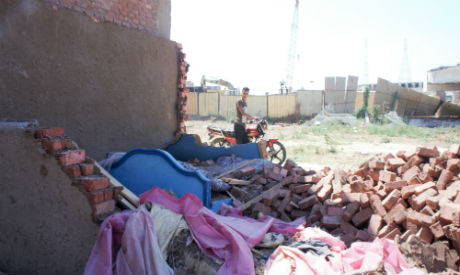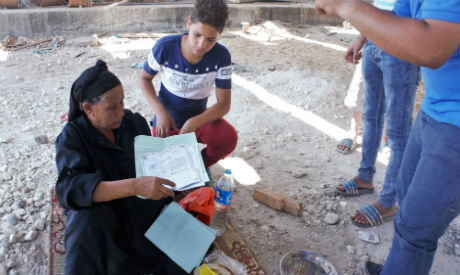A Giza prosecution ordered on Monday the detention of nine people for 15 days pending investigation after they were arrested on Sunday during clashes between police and residents of Cairo’s Warraq Island.
The clashes erupted after the government demolished a number of homes which it said were illegal structures and encroachments on state property, but which residents maintain were legally owned.
One civilian was killed and 19 were injured in the clashes between residents and police and army forces, while at least 33 policemen were injured, according to the interior ministry.
Thirteen people were arrested for inciting violence against security forces, which added to the tension between residents and the government.
Police say the 13 men were arrested during the clashes, while resident claim that they were arrested while at hospital for treatment of injuries suffered during the clashes. The residents say the men arrested were not involved in any violence.
"We were shocked to learn that security forces arrested 13 people of our injured while they were being treated in hospitals in Imbaba, Shobra and El-Sahel," former head of Warraq island’s local council Yahia El-Maghraby told Ahram Online.
Demolitions and clashes
“In a very scary scene… security forces came to conduct a raid, claiming that all the land on the island was state-owned," said the 72-year-old El-Maghraby.
According to El-Maghraby, the clashes started with verbal altercations between residents and security forces, who then fired birdshot.
El-Maghraby says that residents hurled rocks in response to security forces firing birdshot and tear gas.
However, the interior ministry said in a statement that some of the residents gathered and attacked the police with stones and birdshot rounds, prompting security forces to use tear gas to disperse them.
Shortly after the clashes on Sunday, Prime Minister Sherif Ismail issued a statement saying that over 700 judicial decrees had been issued ordering the removal of illegal properties on Warraq Island, and that property owners can still obtain legal status for their illegally-built properties.
Ismail added that no agricultural land would be evacuated or destroyed.
Giza governor Mohamed El-Dali said that the security campaign had only targeted illegal constructions directly on the banks of the Nile.
However, residents say that nine houses were demolished despite being far from the Nile’s banks, adding that the owners of the homes paid electricity bills and had official contracts for their properties.

A demolished house on Warraq Island (Photo: Zeinab El-Gundy)
"The government has had an eye on our island since 2002, at one point claiming that it is state land and another time claiming it was a natural reserve," El-Maghraby says, adding that the administrative ruled in 2002 that the residents had legal ownership of their properties.
El-Maghraby says that the state only owns 60 feddans on the 1,400-feddan island, and that the Religious Endowments Ministry owns 30 feddans and the Agricultural Development Authority owns another 30.
"The Agricultural Development Authority rents some 25 feddans to farmers with official contracts," he said, adding that there are no less than 2,500 families living on the remaining land.
Angry residents say homes were legal
Ahram Online spoke to residents whose homes were demolished, all of whom insist that their homes, mostly two-storey structures, were legal, presenting contracts which they say prove their legal status.

Shokria Mohamed showing home ownership documents to reporters (Photo:Zeinab El-Gundy)
Shokria Mohamed, whose home was among those demolished, showed Ahram Online documents stating that her son had legal ownership of the house.
"I had gone to work early in the morning to work selling grilled corn, and my son had gone to work as well. We returned to find our house in ruins," said the grandmother of four, who is in her 70s, adding that they were not warned in advance.
"We did not have time to get our possessions, except very few things," she said.
Mohamed says she now sleeps under the Rod El-Farag Axis, which passes through the island.
Mohamed’s four grandchildren are staying with their mother at a relative’s home on the mainland.
"All I ask is for the government to compensate us so we can start over. My son saved for years to build this house," she said.
In May, President Abdel-Fattah El-Sisi initiated a campaign to recover illegally seized state-owned land.
In June, authorities announced that the government had recovered more than 919,000 out of 1.9 million feddans of illegally seized farmland, as well as 53 million square meters out of 168 million construction land.
At the time, the president indirectly referred to Warraq Island as an example of the "epidemic of illegal informal buildings in Egypt."
However, El-Maghraby says that the president is being misinformed on the true status of the island.
"We have had an official agricultural association office and school [on the island] for more than 50 years," El-Maghraby said, which he insists proves their presence is legal.
"We have contracts issued by the official notary office of Egypt. The government must respect these contracts in accordance with the law and the constitution," El-Maghraby said.
Short link: